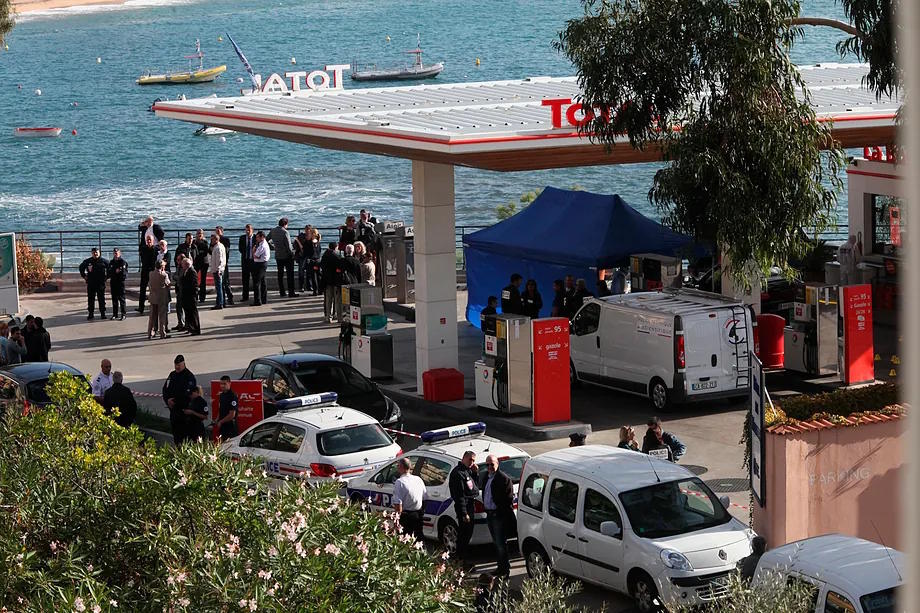It was the murder that shook the island of Corsica: lawyer and nationalist activist Antoine Sollacaro was shot dead with nine bullets - five of them in the head - as he stopped his Porsche Carrera at a gas station in Les Sanguinaires. Two men, on a BMW 1200 GS motorcycle, were the perpetrators of the deadly shooting, which occurred in the midst of the war between Corsican mafia gangs.
Thirteen years later, one of the main suspects finally sits in the dock as the alleged perpetrator of Sollacaro's death. André Bachiolelli, a prominent member of the Le Petit Bar gang, has been appearing before a court in Ajaccio since last Monday. The case of the alleged mastermind of the murder, Jacques Santoni, has been postponed for "medical reasons," and a third suspect, Mickaël Ettori, will be tried "in absentia."
The trial will last for six weeks in a climate of maximum tension in Corsica, considered the most violent place not only in France but in Western Europe, with 18 homicides and 16 attempted murders in 2024, for a population of just 350,000 inhabitants. 2025 is progressing with the same worrying trend: seven homicides in the first six months and a wave of arson attacks that led people to take to the streets with large banners and shouting in Corsican: "A maffia tomba, U silenziu dino" ("The mafia kills, silence too").
Last year, the island recorded a record number of "property damage" incidents, with 2,932 cases, many of them - such as boat burnings - related to mafia extortion. The island also has an endemic problem: the 120,000 weapons circulating among its inhabitants, a proportion comparable to that of many American states.
Recent episodes of violence have reached such an extreme that the Minister of Justice, Gérald Darmanin, traveled to the island this summer to convene all political and social agents and announce urgent measures. The Regional Assembly approved the creation of an anti-mafia commission last week, composed of 17 magistrates specialized in combating organized crime.
"We must put an end to this evil that is corroding the island", declared Darmanin during his visit to Ajaccio. "We must stop this succession of arson attacks, extortions, blackmail, and homicides. We must prosecute in Corsica and make it clear that the State is not afraid."
The trial for the murder of Antoine Sollacaro is seen as a moral and political offensive against the mafia after thirteen years of omertà. "When you kill a lawyer, you are attacking all the values that support justice," emphasized prosecutor Xavier Bonhome in recent days.
Sollacaro's ties to Corsican nationalism also give the trial an unprecedented scope. The President of the Corsican Government, the "autonomist" Gilles Simeoni, leading Femu a Corsica, has also raised his voice against "the multifaceted violence that is devastating our island and threatening to take our children away".
"I believe that the people who killed my father wanted to create terror by attacking an untouchable and irreproachable person," said Anna Maria Sollacaro, daughter of the murdered lawyer, to Le Figaro. His widow, Jeannine Farioli-Sollacaro, expressed hope for an exemplary sentence: "I do not want this trial to be a farce."
"The time for justice has finally come to Corsica," warned lawyer Philippe Soussi, representing civil associations. "This is the most anticipated hearing in our recent history. If the State prevails, it will serve to bring the mafia clans on the island to their knees."
It is estimated that around twenty families control the territory in the 8,700 square kilometers of Corsica. Brise de Mer (Sea Breeze) names the "alliance" in the north, while Le Petit Bar (The Little Bar) extends its roots in the southern half, including the capital Ajaccio. The Venzolasca gang's activity is also very prominent in the north, not to mention the historical influence of the Corsican mafia from Marseille.
"No one can undertake, invest, work, and live peacefully on the island", recently denounced businessman Jean-François Mei, whose boat, the Popeye, was set on fire in an arson attack at the beginning of 2025. "The time has come to tackle this problem head-on. Until now, we have not been able to defend ourselves, we have only been able to suffer."
The parallels with Sicily and the murders of judges Giovanni Falcone and Paolo Borsellino are very evident. Inspired by the Progetto Legalità program in the Italian island, Dr. Josette Dall'Ava-Santucci has promoted the collective Maffia No', a vita lè in Corsica, which organized anti-mafia demonstrations this year alongside the Massimu Susini association.
"The mafia is a taboo subject in families," warns Dall'Ava-Santucci. "And it is very important that children understand what is happening. In the last 18 years, there have been 200 mafia-related murders, and that suggests that there are around 400 children whose parents have been killed. It is an entire generation that needs to verbalize that pain and change the population's attitude towards organized crime."
